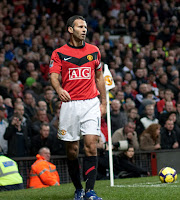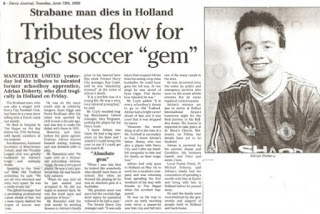Adrian Doherty - the story of the lost genius who was tipped to be the brightest star of Manchester United's golden generation
WILLIAM HILL SPORTS BOOK OF THE YEAR 2016
On the shortlist:
Forever Young: The Story of Adrian Doherty - Football's Lost Genius.
By Oliver Kay (Quercus)Review by Jon Culley
Tales of rising stars robbed of the chance to fulfil their potential are not new but Oliver Kay's story of the fame that fate denied to Adrian Doherty stands out from the crowd.
Doherty, a former apprentice at Manchester United, was a genuine phenomenon, even among a clutch of young players as gifted as those United were nurturing in the late 1980s.
The names that would become known as United's golden generation - Ryan Giggs, Paul Scholes, David Beckham, Nicky Butt and the Neville brothers - were united in their awe of him, a player whose natural ball skills were allied to lightning pace and a fearless attitude that belied his rather shy persona.
Sir Alex Ferguson knew within 15 minutes of first setting eyes on him that he wanted to sign him. He offered him a five-year contract before he was 17, a show of faith in an unproven player that was without precedent.
Adrian Doherty was possibly the most talented young footballer any of them could remember, before or since.
Ferguson's masterplan
 |
| Ryan Giggs |
He was due to have made his senior debut in March 1991 on the same day as Giggs, against Everton at Old Trafford. Instead, he was sitting in the Main Stand, nursing a knee injury sustained in an A-team match. The knee was sore and he feared he might be out of action for a few weeks.
In fact, it was the beginning of the end for a career that had barely begun. Two years later, aged only 20, after rehabilitation programmes and surgery and a number of attempted comebacks, United let him go.
After his football career ended, he naturally faded from view, only for his name to re-emerge in tragic circumstances. On May 7, 2000, he fell into a canal in Holland. A month later, the day before his 27th birthday, he died.
Kay's interest with his story began a decade or so later, when Doherty's name came up while he was researching a feature about Giggs to mark the 20th anniversary of the Welshman's debut. He admits it became an obsession.
A unique personality
 |
| Adrian Doherty |
Brought up in Strabane in Northern Ireland, a town described as being on the frontline of the Troubles, Doherty was different, a non-conformist, a boy for whom football was just one of many fascinations.
He played the guitar, read books and wrote poetry. He wanted to be a musician as much as to be a footballer. Famously, while he was playing in United's A team, he would give away his complimentary match tickets for the senior team and instead catch a bus into Manchester city centre, not to buy clothes or play snooker, the ways in which his teammates might spend their spare time, but to stand on a street corner, strumming his guitar and singing Bob Dylan songs.
Kay visited the family in Strabane. They were unhappy about several aspects of the way he was treated at United both before and after his injury but did not want to be drawn into a war of words. They were reluctant to become involved but in time agreed, on condition that in his book Kay leaned towards celebrating Adrian's life, rather than raging against injustice.
He respected their wishes. The somewhat sordid tales of how apprentices were treated at the club in that time and the shortcomings in the way United dealt with his injury are rightly explored but with others as witnesses.
A tragic accident
 |
| The Derry Journal's report of Doherty's death |
When he died, predictable rumours did the rounds. He had been in Amsterdam, the stories said, and had fallen into a canal late at night. Assumptions were made, with no basis in fact, that drink or drugs were involved.
In fact, as Kay established by checking with Dutch police reports rather than trusting speculation, Doherty had tumbled into a canal not in Amsterdam but in The Hague, where he had taken a job with a furniture manufacturer.
It had happened early in the morning and there was no trace of drugs or alcohol in his body. He had simply had an accident, probably as he made his way to work. Perhaps he was distracted by a daydream. No one knows.
Forever Young is a painstakingly researched and outstandingly well written book, with a sad end and some dark moments along the way. Yet in a way it is an uplifting one, the story of a carefree and likeable young man, a free spirit with a zest for life who took adversity in his stride and enriched the lives of those around him. Oliver Kay tells it with sensitivity and skill.
Forever Young: The Story of Adrian Doherty - Football's Lost Genius, by Oliver Kay (Quercus)
Buy from Amazon, Waterstones or WH Smith
More reading:
(Photo of Ryan Giggs by Gordon Flood CC BY-SA 2.0)
Home
Comments
Post a Comment
Leave a comment or submit your own sports book review